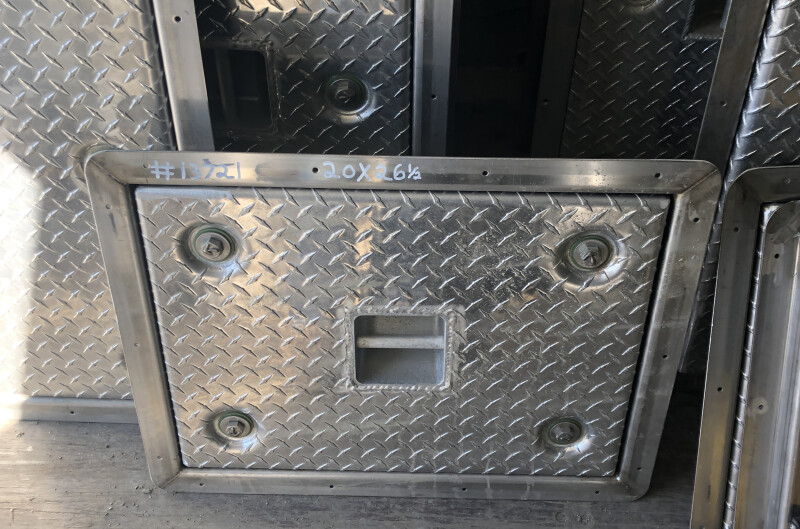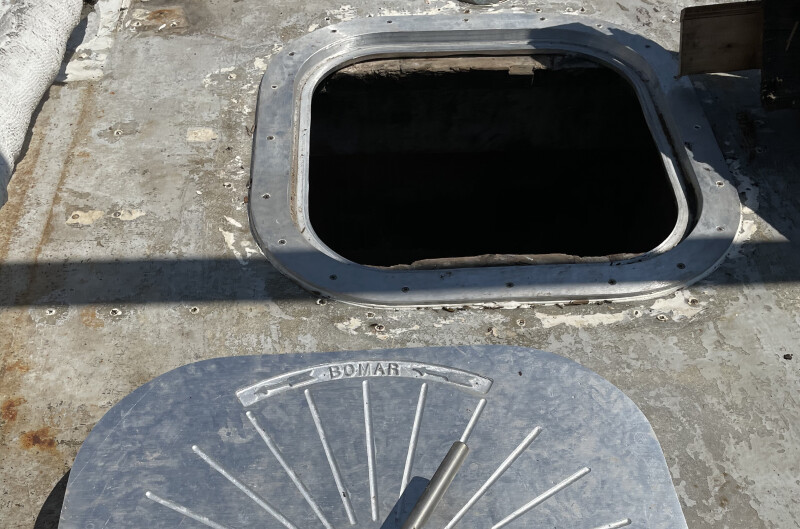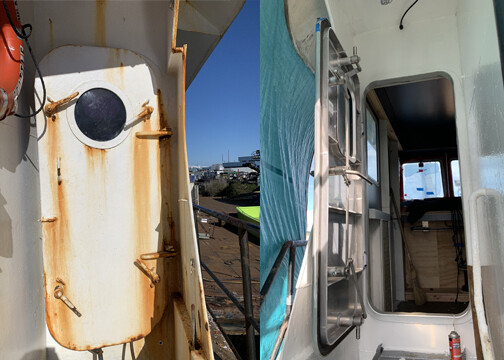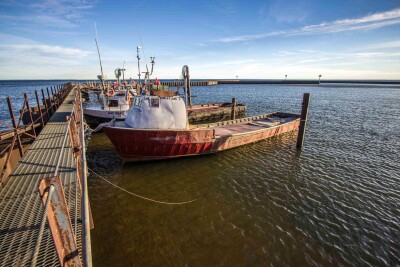Anyone who has ever seen their deck under waves of green water and lived to tell knows the value of reliable hatches. A casual perusal of Coast Guard and National Transportation Safety Board accident reports will reveal numerous cases of downflooding from hatches that fail or have been poorly secured.
Faulty hatches in watertight bulkheads, or over shaft alleys, can also lead to water loss and free-surface effect in live tanks or RSW holds, or flooded engine rooms. Everyone who works on the water has heard horror stories of these sorts of things at one time or another.
In this writer’s first blow, September 1978, 200 miles off the northern California coast, a few dozen albacore boats and at least as many lives were lost.
“I remember it well, even though I was only in grade school,” says Debbie Spencer, of Brookings, Ore. “I was out with my dad, Howard Rigel, on his 36-foot wooden boat the F/V Dorothy V, 250 miles out. Waves washed all our hatch covers off. We had to turn around, pick them up, and nailed them all on. Listening to all the radio traffic, maydays and the Coast Guard, all night. I looked at my dad and said, ‘We’re going to die, aren’t we?’ My dad responded, ‘Hell no, we’re not going to die. Now you go lay down, and when you get up, we’ll be safe.’”

Aware that seaworthy hatches, doors and windows are vital for any boat, manufacturers are doing their best to give fishermen what they need. At the Snow & Co. yard in Seattle, the Wizard, of “Deadliest Catch” fame, is getting new doors from a Norwegian manufacturer, Libra.
“She took a wave that went through the wheelhouse,” says Eric MacDonald, Pacific Northwest sales manager for Imtra, a New Bedford, Mass.-based company that sells the Libra doors. “That wiped out everything. So when they were redoing the wheelhouse, they decided to replace the doors, too.”
According to MacDonald, the Wizard owners chose aluminum doors in steel frames with the largest possible ports.
“I went down to the Snow yard here in Seattle and measured for the new doors. We have two types of frames, flat and L. With the flat, the measurements have to be exact, but with the L it has a little play.” MacDonald measured the area, and they sent the specs to Norway, where the doors are manufactured and then shipped by sea or air freight. “Because of the quick turnaround time on this one, we used air freight.”
Imtra sells three kinds of Libra doors — aluminum, steel and GRP, which is a type of fiberglass.

“We also sell UV shades,” says MacDonald, noting that he supplied some for the Progress, which also had its wheelhouse windows smashed, and the wheelhouse flooded, while fishing in the Bering Sea. “We try to get people to use the UV shades when they’re building. It’s easier than when it’s an afterthought.”
Windows are important, too. And Bomar, the well-known maker of hatches, has brought out a new line of windows that includes steel frames.
“We’ve been making hatches forever,” says Bomar Sales Manager Bob Touton. “But coming out of the recreational boatbuilding recession of 2008, it became apparent that we had to diversify across different product lines. It took a few years to get the right people in, but we’re fortunate to have Tom Norton, from Maine, and he’s been working with our engineers in New Hampshire. And we now have an entirely revamped line of commercial products.”
Touton notes that Bomar products are aimed at smaller fishing vessels, so they can cross over into other markets.
“We still make our cast aluminum hatches, which we’ve been making for decades. And over the last several years, we’ve made deck access plates, where if you don’t need a Lloyds certificate, it can get the job done and save you some money.”
Different agencies certify the integrity of hatches and doors on commercial vessels. In the United States, hatches, doors and windows exposed to the elements generally need to be watertight or weathertight.
According to Coast Guard rules, watertight means “designed and constructed to withstand a static head of water without any leakage.” Weathertight means that “water will not penetrate into the unit in any sea condition.”
“A hinged window or a sliding window is at best going to be weathertight,” says Touton. “With a fixed window, there are different ratings, depending on the size and the thickness of glass you’re going to float into it, and then the frame has its own integrity.” Bomar’s new line of windows includes the option of steel frames for welding into steel vessels, and aluminum frames for aluminum and fiberglass vessels. The glass can be tempered, laminate, and even fire rated.
Skippers Fisheries, in Lower Woods Harbor, Nova Scotia, has been making flush-mount deck hatches for Canadian lobster boats for years, and the company’s products are common on U.S. lobster boats.
“A lot of lobster boats are open stern now, and they like the flush mount so they can stack the traps on deck and set them without anything to catch on,” says Tristen Goodwin, assistant welding manager at Comeau Sea Foods, which owns Skippers.
“Our hatches have a stainless-steel frame that is screwed into the deck of the boat, and that holds a 3/4-inch rubber gasket. And the covers are made from ¼-inch aluminum,” says Goodwin. “We have a special recipe for aluminum that’s made for us to use for hatches, and those dog down into the rubber, which makes a really nice watertight seal. A lot of fishermen really like that, especially when they’re covering up their fish hold. Because they don’t want contaminants in the fish.”
The U.S. Coast Guard also has strict regulations regarding coamings on some hatches. “We make hatches for coamings on swordfish boats and draggers,” says Goodwin. “Where they have ice and want to keep the hold cold. We also make insulated hatches.”
Skippers makes reinforced hatch covers for engine rooms, and hatches that are dogged using a special wrench.
On the West Coast, Baier Marine is putting hatches on many commercial vessels including the Alaska king crab vessel Keta, which underwent a major conversion at Fred Wahl’s yard in Reedsport, Ore. (See the full story on page 26.) “Our aluminum hatch sales are continuing strong,” says Alexander R. “Sandy” Smith, director of Business Development at Baier Marine. We saw a little dip because of covid, but not much.”
Baier makes a range of hatches, including flush-deck (hinged and pull-up) and internal hinge watertight hatches. According to Smith, Baier has designed a high-quality hatch that works, and the company appears to be following the old saying: If it’s not broken, don’t fix it.
Freeman Marine Equipment began in 1976, making hatches in a garage in Gold Beach, Ore. Since then it has grown to become a recognized and highly respected international name in commercial boat products. Today, Freeman sells to more than 50 countries, from the Bahamas and China to Turkey and Uruguay.
According to Harmony Poisson, the marketing specialist at Avantec, which now owns Freeman, the company has several new products in the pipeline. “Unfortunately, we are not ready to talk about them yet,” she says.
At present, the company makes everything from cast aluminum oval deck hatches to watertight and weathertight doors. Freeman’s fixed and opening portlights and heavy-duty windows have also found homes on many commercial fishing vessels.
In addition to its hatches, doors and windows, Freeman also provides several online services, including instructional videos, documents, product support, and the company’s own naval architects.
When it gets breezy offshore and rigging starts to sing, a vessel’s integrity — and the lives of her crew — depends on sound hatches, doors and windows, and the companies that make them.







